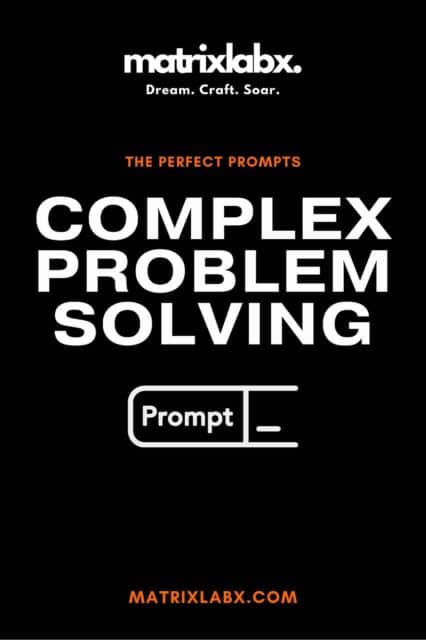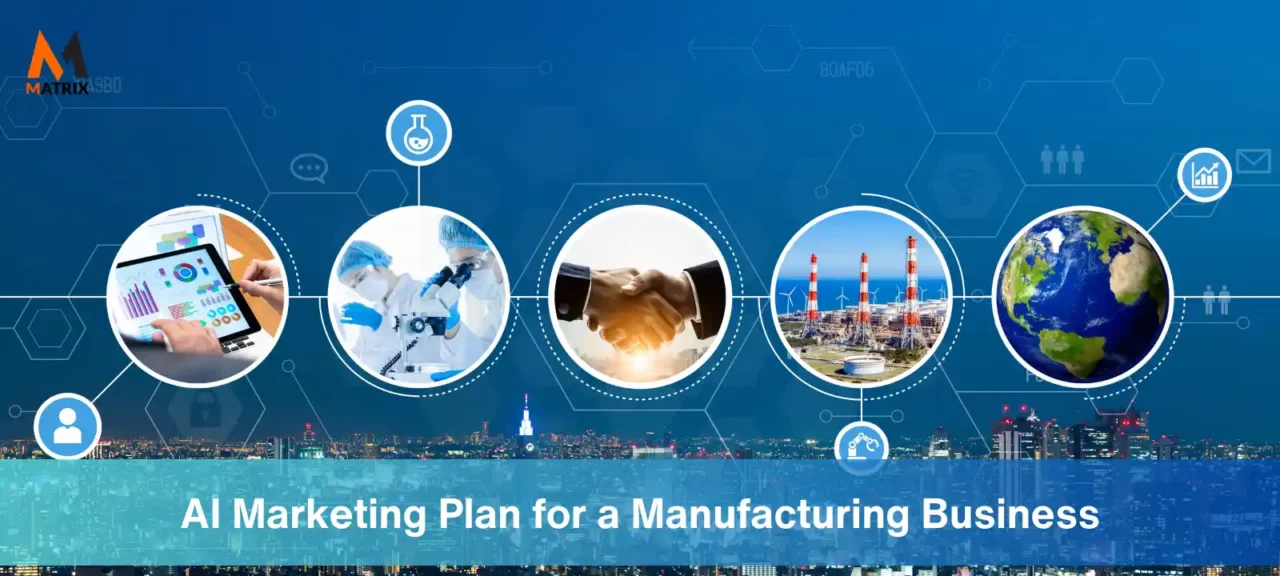AI Marketing Plan for Manufacturing Businesses
Need an AI Marketing Plan for a Manufacturing Business. Done!
As marketers increasingly turn to automation and AI to reach customers more effectively, understanding how best to apply such technology is essential.
Today’s manufacturing companies are no exception; they must stay ahead of the curve and use innovative methods, such as AI marketing plans, to remain competitive in their industry.
80% of manufacturing organizations consider machine-generated event monitoring to be valuable.
In this blog post, we’ll discuss the importance of leveraging artificial intelligence (AI) to develop an effective marketing plan specifically catered to manufacturing businesses – from data analysis to reaching those all-important KPIs!
What are the top 5 marketing challenges manufacturing companies have?
Like many other industries, manufacturing companies face various marketing challenges. Here are five of the top challenges they often encounter:
1. Understanding Customer Needs: Unlike B2C companies that interact directly with their customers, many manufacturing companies operate in a B2B context, often one step removed from the end-user. This can make it challenging to fully understand customer needs, preferences, and buying behavior, which is crucial for effective marketing.
2. Digital Transformation: The manufacturing industry has relatively slowly adopted digital technologies compared to other sectors. Transitioning from traditional to digital marketing strategies can be complex and daunting. It requires not only technological changes but also changes in culture and mindset.
3. Brand Differentiation: Standing out in an industry often dominated by similar products and competitors can be challenging. Many manufacturing companies face the significant challenge of developing and effectively communicating a unique value proposition to potential customers.
4. Content Marketing: Creating relevant, engaging, and educational content that appeals to potential customers can be challenging, especially given the technical nature of many manufacturing products. Yet, content marketing is crucial for attracting and retaining customers in the digital age.
5. Lead Generation and Conversion: Generating high-quality leads and converting them into customers is a common challenge. This requires a deep understanding of the customer’s buying journey, an effective sales process, and, often, close collaboration between marketing and sales teams.
To overcome these challenges, manufacturing companies can benefit from investing in market research, digital technologies, brand development, content marketing strategies, and sales and marketing alignment. They can also hire a digital marketing agency like Matrix Business AI.
OrchestraAI Marketing Platform – WATCH
OrchestraAI utilizes a compound AI agent architecture as an AI Agentic Platform. This architecture seamlessly integrates multiple specialized AI agents into a cohesive system, enabling it to tackle complex, multifaceted marketing tasks.

Priority use cases for AI in manufacturing
- Machine-generated events monitoring. Interpret telemetry from equipment to reduce unplanned downtime, utilize operations, and maximize utilization.
- Customer service automation. Provide an easy, informative, and evaluated customer service experience that automates and accelerates time to resolution for common customer interactions.
- Document search and synthesis. Retain generations of documents to route the product lifecycle and use them to generate new content as needed or as archival storage and retrieval systems.
- Product and Content catalog discovery. Efficiently match requirements to the specifications of products purchased.
- Supply chain advisor. Optimize fulfillment by recommending best-suited suppliers based on relevant criteria.
What skills are required to deliver a world-class AI marketing strategy?
The skills required to deliver world-class services from an AI digital marketing agency such as MatrixAI are diverse and span several domains. Here are the key areas of expertise your agency should cultivate to position itself as a premier choice:
1. AI and Data Science Expertise: Your team needs an in-depth understanding of AI, machine learning, data analytics, and natural language processing. They should be capable of developing, implementing, and optimizing AI algorithms to provide predictive insights, automate processes, and personalize marketing efforts.
2. Marketing Technology Proficiency: Your team should be adept at using a wide range of AI-driven marketing technologies. This includes customer relationship management (CRM) tools, content management systems (CMS), social media management, SEO, programmatic advertising, and analytics.
3. Digital Marketing and Inbound Skills: Traditional digital marketing and inbound marketing skills remain crucial despite the focus on AI. This includes SEO, SEM, content marketing, email marketing, social media marketing, and more. Your team should understand how to incorporate AI into these strategies to enhance effectiveness.
The Skill Gap: Why 85% of Marketers Are Not Ready
The Skill Gap: Why 85% of Marketers Are Not Ready highlights the urgent need for upskilling in a rapidly evolving digital landscape. Advanced technologies like AI, data analytics, and automation are outpacing traditional marketing expertise, leaving most professionals unprepared to adapt and compete effectively.
4. Data Privacy and Ethical AI Use: Given the amount of data AI utilizes, understanding data privacy laws and ethical considerations is crucial. Your team should know how to handle customer data responsibly and ethically, ensuring privacy and trust.
5. Customer Centricity: Understanding customer behavior, needs, and preferences is key to any marketing strategy. Your team should be skilled in customer segmentation, buyer persona development, customer journey mapping, and customer experience optimization.
6. Strategic Thinking: Your team needs to think strategically about how to apply AI to solve marketing challenges and deliver real business outcomes. They should be able to design and implement AI marketing strategies tailored to each client’s needs and goals.
7. Analytical Skills: With the vast amounts of data involved in AI marketing, analyzing and interpreting this data to gain actionable insights is crucial. Your team should have strong data analysis skills and be comfortable working with big data.
8. Creativity: Even in an AI-driven agency, creativity is key. Whether creating engaging content, designing unique marketing campaigns, or finding innovative ways to use AI, creativity helps differentiate your agency from others.
9. Project Management: Your team should be capable of managing complex projects, coordinating with different team members and stakeholders, meeting deadlines, and delivering results.
10. Communication and Collaboration: Clear and effective collaboration are crucial in a fast-paced, interdisciplinary field like AI marketing. Your team should be adept at communicating complex AI concepts in a way that clients and other team members can understand.
By cultivating these skills, MatrixAI can deliver world-class AI digital marketing services and differentiate itself from traditional digital and inbound marketing agencies, asserting its position as the premier choice in the field. AI Blog Post Generation GPT Agent: Unleash the Future of Content Creation
AI marketing plan for a manufacturing business:

Artificial intelligence (AI) has become a game-changer for the manufacturing industry, allowing businesses to optimize processes, reduce costs, and increase productivity. To stay competitive, a solid AI marketing plan is essential.
A manufacturing business must take a strategic approach to integrating AI into its marketing plan, considering its target audience, key performance indicators (KPIs), and available data sources.
AI can help businesses create personalized content, target the right audience, and automate campaigns. By leveraging AI, a manufacturing business can ensure its marketing efforts are measured, adaptable, and aligned with its overall business objectives.
I. Executive Summary for an AI marketing strategy for a manufacturing company
Executive Summary
The manufacturing industry has been relatively slow to adopt AI-based marketing compared to other sectors, and as a result, many opportunities for growth and efficiency remain untapped. This AI marketing strategy aims to rectify this situation by leveraging advanced AI technologies and methodologies to improve customer engagement, operational efficiency, and return on investment (ROI) in marketing efforts. What is Neuro-Symbolic AI for Precision Marketing?
Our strategy employs AI tools to collect, analyze, and utilize vast amounts of data, transforming it into actionable insights. We plan to use AI for predictive analytics, enabling us to accurately forecast market trends and customer behavior. This data-driven approach will allow us to anticipate customer needs better, tailor our offerings, and improve our timing in reaching out to prospects, ultimately leading to increased sales conversions.

AI will create detailed customer segments based on purchase history, browsing behavior, and demographic data to boost personalization. This will allow us to deliver highly personalized marketing content, enhancing customer engagement and brand loyalty.
Further, we intend to exploit AI capabilities for programmatic advertising. This involves using AI algorithms to automate the ad buying process, ensuring ads are displayed at the right time, in the right place, and to the right audience, and improving the efficiency and effectiveness of our advertising efforts.
We will also utilize AI for SEO optimization to improve our online presence and visibility and increase organic traffic. AI will help us identify relevant keywords, optimize website content, and provide insights into improving our search engine rankings.
Lastly, we’ll implement AI-powered chatbots to provide round-the-clock customer service and engagement. These bots will answer queries, resolve issues, and collect customer data to personalize our marketing strategies further.
Implementing this AI marketing strategy will give our company a competitive edge, increase marketing ROI, improve customer satisfaction, and drive revenue growth. The future of marketing in the manufacturing industry is AI-driven, and with this strategy, we aim to lead the way.
Overview of the plan’s objectives, key strategies, and expected outcomes.
A successful plan requires clear objectives, key strategies, and expected outcomes. By providing an overview of each of these elements, the plan becomes more accessible and understandable.
The objectives should be specific, measurable, achievable, relevant, and time-bound, while the key strategies should be well-defined and thoroughly researched. The expected outcomes should align with the objectives and provide insight into what can be accomplished through the plan’s implementation.
With these components in place, the plan becomes a roadmap for success, creating a clear path for achieving the desired outcomes. By understanding the plan’s objectives, key strategies, and expected outcomes, stakeholders can work toward a common goal and progress toward success. How to Choose the Right AI Digital Marketing Agency: A Comprehensive Guide for Marketing Managers
II. Introduction to AI in Marketing

In today’s fast-paced digital world, businesses always look for innovative ways to stay ahead of the curve.
One emerging trend that is revolutionizing the marketing landscape is artificial intelligence (AI). With the ability to analyze vast amounts of data and make intelligent decisions, AI has the potential to transform the way marketers attract and retain customers. By utilizing machine learning algorithms and predictive analytics, businesses can gain valuable insights into consumer behavior and tailor their marketing strategies accordingly.
AI is paving the way for a more efficient and effective marketing approach, from personalized product recommendations to targeted advertising campaigns. Whether you’re a small startup or a large corporation, embracing AI in your marketing efforts can help you stay ahead of the competition and achieve your business goals.
– Explanation of what AI is and how it can be leveraged in marketing.
Artificial Intelligence, popularly known as AI, is a rapidly evolving technology that has revolutionized various industries, including marketing.
AI involves machines learning and adapting to certain tasks it has been programmed to do. In marketing, AI technology can personalize customer experiences, analyze large data sets to make better decisions and automate repetitive tasks.
With the help of AI, marketers can better understand customers, create targeted content, optimize campaigns, and improve lead generation.
By leveraging AI in marketing, companies can improve their return on investment, increase revenue, and foster brand loyalty. AI has the potential to transform the future of marketing.
The Skill Gap: Why 85% of Marketers Are Not Ready
The Skill Gap: Why 85% of Marketers Are Not Ready highlights the urgent need for upskilling in a rapidly evolving digital landscape. Advanced technologies like AI, data analytics, and automation are outpacing traditional marketing expertise, leaving most professionals unprepared to adapt and compete effectively.
Overview of the current AI adoption in the manufacturing sector.
Artificial Intelligence (AI) is rapidly transforming the manufacturing sector. Advanced technologies like machine learning algorithms, predictive analytics, and robotics are helping production facilities streamline their operations, reduce downtime, and cut costs.
One of the most notable benefits of AI in manufacturing is its ability to increase efficiency by enabling machines to learn from data and perform tasks with precision and speed. For example, predictive maintenance algorithms can detect potential equipment failures before they occur, reducing unplanned downtime.
Moreover, robots equipped with AI can work alongside human operators, improving safety and productivity on the shop floor. Despite the many benefits of AI in manufacturing, some challenges still need to be addressed, such as the need for skilled workers to operate and maintain complex systems.
Overall, the current adoption of AI in the manufacturing sector is promising, and this technology will continue to play a critical role in driving innovation and growth in the industry for years to come.
III. Market Analysis

Market analysis is a vital component of any business strategy. It involves a detailed examination of market trends, customer behavior, and competitor strategies to better understand the market.
This information is then used to identify growth opportunities, improve products and services, and better tailor marketing campaigns to reach target audiences. A thorough market analysis enables businesses to make well-informed decisions and, ultimately, achieve their desired results.
With it, businesses can operate smoothly in a crowded marketplace and exploit potential opportunities. Therefore, it is essential to prioritize market analysis in any business plan.
Data collection from various sources such as sales data, industry reports, social media, and more.
In today’s digital age, businesses can access unlimited data from various sources, from sales data to industry reports and social media trends.
Collecting and analyzing this data can provide valuable insights to help companies make informed decisions about everything from product development to marketing strategies. By harnessing the power of data, businesses can gain a competitive edge and stay ahead of the curve in an ever-evolving marketplace.
However, with so much information available, it’s crucial to have the right tools and analytical skills to gather and interpret the data effectively. With the right approach, data collection can be valuable in the quest for success.
AI tools are used to process this data to analyze market trends, customer behaviors, and competitive analysis.
AI tools can help companies gain valuable insights into market trends, customer behaviors, and competitive analysis. Using machine learning algorithms, AI can identify patterns and predict future demand.
70% of agencies need help integrating AI solutions.
70% of agencies need help integrating AI solutions into their tech stack, citing a lack of interoperability as a major barrier. 85% of marketing agencies need more in-house expertise to manage and deploy multi-AI agent systems effectively.
IV. Customer Segmentation
One key element to success in any business is understanding your customer base. After all, it’s your customers who will ultimately determine the growth and longevity of your company. That’s where customer segmentation comes in.
By dividing your customer base into smaller, more specific groups, you can better tailor your products, marketing efforts, and customer service to meet their needs and preferences.
Whether you’re a start-up or an established company, analyzing and segmenting your customers can help you build stronger relationships, increase customer loyalty, and drive growth.
Use AI to segment customers based on their behaviors, preferences, purchasing habits, etc.
With the rise of technology in the 21st century, businesses rely more on artificial intelligence to understand their customers.
Businesses can use AI algorithms to segment their customers based on various factors, including purchasing habits, behaviors, and preferences.
These insights empower businesses to provide personalized experiences to each customer, ultimately leading to increased loyalty and revenue.
AI in customer segmentation is still a relatively new concept, but it is rapidly becoming a staple for businesses looking to thrive in an increasingly competitive market. AI has endless possibilities, and the future of customer segmentation looks bright.
Develop profiles for each customer segment.
Understanding your customers is key to any successful business, starting with developing profiles for each customer segment.
You can create profiles that outline their unique needs, preferences, and behaviors by getting to know your customers. This information can help you tailor your marketing messaging, product offerings, and customer experience to meet their needs better.
With well-developed customer profiles, you can more effectively target your efforts, deepen customer loyalty, and drive business growth.
So remember to underestimate the power of getting to know your customers- it could be the key to unlocking your business’s true potential. What is an AI Content Assessment?
V. AI-Driven Marketing Strategies

In the marketing world, one trend gaining traction in recent years is using AI-driven strategies. With vast amounts of data nowadays, marketers increasingly use artificial intelligence to analyze and make sense of all this information.
By leveraging the power of machine learning algorithms and predictive analytics, companies can better understand their customers and deliver more personalized experiences.
This can increase customer satisfaction and loyalty and improve sales and revenue. Of course, implementing AI-driven marketing strategies can present challenges, such as concerns about data privacy and transparency.
But as technology continues to evolve, it’s clear that AI will play an ever-more important role in shaping the future of marketing.
Personalized Marketing Campaigns: Design strategies for each customer segment using AI tools.
In today’s fast-paced world, consumers expect personalized experiences with the brands they interact with. To cater to these demands, businesses now use AI-powered tools to design effective marketing strategies for each customer segment.
By analyzing vast amounts of data, these tools can identify customer patterns and preferences, enabling businesses to deliver targeted messages that resonate with each individual.
With personalized marketing campaigns, businesses can increase customer engagement, drive sales, and ultimately build long-lasting relationships with their consumers.
The power of AI is truly revolutionizing the world of marketing, and businesses that embrace it are sure to stay ahead of the game.
Predictive Analytics: Use AI to anticipate future demand and customer behavior.
In today’s fast-paced world, businesses must stay ahead of the game to succeed. Predictive analytics leverages the power of AI to anticipate future customer behavior and demand.
By analyzing data from past customer interactions, businesses can identify trends and patterns, which they can then use to predict what their customers will do next.
This is particularly helpful for businesses that operate in highly volatile markets, as they can make informed decisions based on the insights gained from predictive analytics.
As technology evolves, predictive analytics will become even more sophisticated, enabling businesses to stay one step ahead of their competitors and meet their customers’ ever-changing needs.
SEO and Content Creation: Use AI tools to identify keywords, create SEO-optimized content, and track website performance.
With the ever-growing importance of digital presence, developing a website that ranks well on search engines is crucial.
Fortunately, we now have the advantage of Artificial Intelligence (AI) to help us create content tailored to SEO requirements. AI tools can conduct keyword research, analyze data, and develop content that contains relevant keywords.
Here’s an example of advanced manufacturing in China
Moreover, AI can track website performance, optimizing content to improve website ranking and attract more traffic. Using AI tools in SEO and content creation, website owners can drive traffic to their pages and increase their online presence.
Sure, here’s a list of top AI tools that can be highly beneficial for marketing efforts:
- Salesforce Einstein: An AI assistant within Salesforce, it can predict the future behavior of customers, recommend the best next actions, and even automate tasks.
- Marketo (Adobe): While not purely an AI tool, it incorporates machine learning to improve marketing automation, campaign targeting, and customer interaction.
- Hootsuite: Its AI capabilities can help to determine the best time to post on social media platforms for optimal engagement.
- Google Analytics: Google’s machine learning algorithms can provide insights into customer behavior, website performance, and digital marketing campaign effectiveness.
- IBM Watson: This powerful AI system can analyze customer data to provide insights and even help create content.
- MatrixAI uses AI in several ways, including predicting customer behavior, personalizing emails, AI professional staff, and creating content strategy recommendations.
- Optimizely: AI-powered A/B testing tool that helps optimize the customer experience on websites, mobile apps, and connected devices.
- Crayon: This tool uses AI to track and analyze competitors’ digital footprint, helping with competitor analysis and market research.
- Chatfuel is an AI chatbot platform that creates conversational bots on Facebook Messenger. It can improve customer engagement and automate responses.
- Albert: An autonomous digital marketer who drives digital marketing campaigns, helps with decision-making, and optimizes marketing efforts across channels.
While all these tools offer valuable AI-powered features, choosing those that best align with your marketing goals, strategies, and customer base is crucial. It’s not necessarily about having the most tools but having the right ones.
VI. Implementation of AI Tools

As we move into the future, technology continues to evolve rapidly, and the integration of Artificial Intelligence (AI) tools has become increasingly prominent. Implementing AI tools in various systems has changed how we do things, from simple tasks like automatically sorting emails to complex operations such as predicting customer behavior.
These tools have the potential to simplify and streamline processes, leading to greater efficiency and increased profits. However, implementing AI tools requires careful consideration and planning.
Budget and skill level must be considered to ensure the implementation is successful. Done properly, implementing AI tools can lead to revolutionary changes in how tasks are approached and completed.
Social Media Monitoring: Use AI to track customer sentiment, brand mentions, and feedback on social media.
In today’s digital age, companies must monitor their online presence. Social media has become a powerful platform for customers to voice their positive and negative opinions about a brand.
But manually tracking and analyzing every post, comment, and mention can be daunting. This is where AI comes in to save the day.
By utilizing AI-powered social media monitoring tools, companies can keep a finger on the pulse of customer sentiment, track their brand mentions, and gather valuable feedback to help improve their products and services.
With the help of AI, businesses can streamline their social media management and stay ahead of the game.
Chatbots and Virtual Assistants: Implement AI chatbots for customer support and sales.
Investing in chatbots and virtual assistants is essential for businesses looking to stay competitive and provide exceptional customer service.
With the increasing use of technology and the shift towards remote work, investing in chatbots and virtual assistants is essential for businesses looking to stay competitive and provide exceptional customer service.
By implementing AI-powered chatbots, businesses can handle customer support and remote work.
AI in Email Marketing: Use AI to optimize email content, send times, open rates, and click-through rates.
Email marketing has gained popularity in recent years, and for good reason. It’s a cost-effective way for businesses to communicate with customers and provide them with valuable content.
However, optimizing your email content to stand out is essential, with so many emails flooding inboxes. Enter AI. Artificial Intelligence can assist in streamlining your email marketing efforts by analyzing data and helping you achieve higher open rates and click-through rates.
By utilizing AI, you can also determine the optimal times to send emails, ensuring your messages are delivered at the right moment. Incorporating AI into your email marketing strategy is a game-changer that can help businesses easily achieve their marketing goals.
VII. Performance Tracking and Improvement

Tracking your performance is crucial in achieving success in sports, academics, or even your career. It allows you to identify areas where you excel and areas where improvement is needed.
You can evaluate your strategies by tracking your progress and determining what works best. With this information, you can adjust your approach and set realistic goals that challenge you to grow as an individual. The process of performance tracking and improvement is ongoing.
Still, by taking active steps towards progress, you can reach your full potential and always be working towards becoming the best version of yourself.
Use AI tools to monitor the performance of your marketing campaigns.
In today’s digital age, utilizing AI tools can be the make-or-break for successful marketing campaigns. AI-powered tools can adapt quickly, allowing for timely adjustments to be made to campaigns in real time.
By implementing tools that can monitor and analyze data, marketers can gain valuable insights into what’s working and what’s not. Additionally, by automating certain processes, marketers can save time and resources that can be better allocated toward other important aspects of their business.
With the ability to constantly learn and improve, AI tools have become invaluable assets for modern marketers looking to stay ahead.
Analyze customer engagement, click-through rates, conversions, and ROI.
It’s important to analyze various metrics beyond clicks or views to understand a marketing campaign’s effectiveness truly.
Delving into customer engagement, click-through rates, conversions, and ROI provides a more complete picture of how your audience interacts with your brand.
Customer engagement gives insight into how invested users are in your content and messaging, while click-through rates indicate how many people followed through on your call to action. Conversions provide solid evidence of how many leads or sales were generated, and ROI allows you to see if the investment in your campaign was worth it.
By analyzing these metrics, businesses can make more informed decisions about their marketing efforts and tailor future campaigns to serve their audience better.
Use these insights to improve future campaigns and adjust the marketing strategy.
In the marketing world, gathering insights and analyzing data is crucial for the success of future campaigns.
Businesses can adjust their marketing strategy by studying the metrics and learning from past successes and failures. With consumer behavior and trends constantly evolving, staying proactive and adaptive regarding marketing tactics is important.
By utilizing these insights, businesses can implement changes leading to better ROI and engagement with their audience.
So whether it’s revamping a social media strategy or trying out a new ad campaign, taking the time to assess previous efforts can make all the difference in creating a successful marketing plan for the future.
VIII. Risk Management
Risk management is critical for any organization to survive and thrive in today’s uncertain world. It identifies, assesses, and mitigates potential risks adversely affecting your business.
A well-designed risk management plan protects companies from industry- or market-related, regulatory, and operational risks. The most effective risk management solutions involve taking a proactive approach, identifying risks before they become problems, and establishing strategies to mitigate them.
By planning, businesses can minimize disruption to operations, manage financial losses, and maintain a positive reputation in the market. The key to successful risk management is to assess and manage risks with one clear goal: to protect your organization from harm.
By doing so, you can ensure that your business continues to grow and thrive, no matter what the future holds.
Plan for potential risks related to data security, privacy, and ethical issues related to AI.

Data security and privacy have become paramount concerns for businesses and individuals in today’s digital age. With the rise of Artificial Intelligence and Machine Learning technologies, there are also growing ethical concerns related to AI.
In today’s business landscape, a comprehensive plan for potential risks related to data security, privacy, and ethical issues related to AI is essential.
This plan should include measures to secure sensitive data, protect personal information, and ensure that AI technologies are used ethically and responsibly.
Proactively addressing these risks can help businesses build customer trust, protect their reputations, and mitigate potential legal and financial consequences.
It’s important to remember that data security, privacy, and ethical concerns related to AI are ongoing issues that require continuous evaluation and updating as technology evolves.
Develop policies to mitigate these risks and ensure compliance with relevant regulations.
Financial, operational, or legal risks are always involved in any business. Companies must develop policies that mitigate these risks and ensure compliance with relevant regulations.
These policies can ultimately protect the company, its employees, and its customers. Businesses can minimize losses and prevent legal repercussions by conducting regular risk assessments and implementing effective policies.
Companies must stay current and consider all the regulations and laws that may apply to their operations. Doing so can avoid possible legal action and maintain their reputation as trustworthy and responsible entities.
IX. Budget and Resources
As with any endeavor, having a solid budget and adequate resources is crucial to success.
Regarding a project or organization’s budget and resources, it’s important to balance having enough funding to achieve your goals and not overspending unnecessarily.
It’s also essential to consider resource availability, whether physical equipment or personnel, and plan accordingly. With careful planning and smart resource allocation, any project can maximize its budget and achieve its goals efficiently and effectively.
Skills Required to Deliver World-Class In-House AI Marketing Plan
- AI and Machine Learning Expertise: In-house staff need to understand AI and its application in marketing. This includes predictive analytics, customer segmentation, personalization, and programmatic advertising.
- Data Analysis Skills: To make the most of AI, the team needs to be skilled in data analysis and able to turn vast amounts of raw data into actionable insights.
- Digital Marketing Knowledge: The team should be well-versed in traditional digital marketing strategies, from SEO to content marketing, and understand how to enhance these with AI technologies.
- Customer-Centric Approach: Understanding the customer is key. The team should be able to analyze customer data to understand their needs, preferences, and behaviors and to deliver personalized marketing strategies.
- Technical Skills: As an Industrial Machinery Manufacturing Company, technical knowledge about the products, industry trends, and the competitive landscape is crucial to creating a relevant and effective marketing plan.
- Project Management Skills: The team should be skilled in managing complex projects, coordinating different activities, meeting deadlines, and ensuring the successful implementation of the marketing plan.
- Creativity: Creativity is key to differentiating the company from competitors and creating engaging, unique marketing campaigns.
Cost Breakdown and Return on Investment (ROI)
Note: The figures below are estimates and can vary based on numerous factors.
- AI Marketing Software: The cost of AI marketing software can range from $10,000 to $50,000 annually, depending on the required tools and functionalities.
- Data Acquisition: Depending on the source, purchasing third-party data could cost between $1,000 and $10,000.
- Staff Training: The cost of training existing staff or hiring new experts can range from $5,000 to $25,000.
- Implementation: This could include costs for IT infrastructure, integration with existing systems, and project management. Expect to budget $10,000 to $30,000.
- Ongoing Maintenance and Support: This could cost about $5,000 to $10,000 annually.
Given these estimated costs, an in-house AI marketing initiative might cost approximately $750,000 in salaries and about 12% of your projected revenue if you are a startup plan of 16%.
However, the ROI tends to slow and lag behind competitors using AI marketing agencies. Using AI to improve customer segmentation, personalization, and predictive analytics could increase your conversion rates by 5-10%. For a company with revenues of $75 million, a 5-10% increase in conversion could yield an additional $3.75 to $7 million in revenue, greatly outweighing the initial investment.
Cost Breakdown and Return on Investment (ROI) for an AI Digital marketing agency and MatrixAI
- Agency Retainer Fee: AI marketing agencies usually charge monthly service fees. These can vary significantly based on the size and complexity of the campaign, but for a mid-sized business with $75 million in revenue, expect them to range from $10,000 to $15,000 per month or $120,000 to $180,000 per year.
- Software and Tools: The cost of software and tools used for AI-based marketing will often be included in the agency’s fee, but there may be additional charges in some cases. If so, expect this to range from $1,000 to $10,000 annually. MatrixAI it’s included.
- Media and Advertising Spend (variable): This budget will be allocated to paid advertising campaigns. The agency will manage this spending. For a business of this size, a recommended advertising spend could be around 10-12% of revenue, or $7.5 to $9 million. However, this budget can be adjusted based on the company’s goals and financial situation.
- Implementation Costs: Additional costs might be incurred for initial setup, integration with existing systems, and creation of initial marketing assets. These could range from $5,000 to $25,000.
The overall cost of hiring an agency like MatrixAI for a $75 million industrial machinery manufacturing company could range from roughly $120,000 to $1800,00 in the first year, depending on the marketing efforts and advertising budget scale. These figures exclude the advertising budget.
Return on Investment
The ROI from hiring an AI marketing agency like MatrixAI could be significant. AI can enhance all aspects of your marketing strategy, increasing conversion, customer retention, and average customer lifetime value.
If the AI marketing campaign increases the conversion rate by 10-20%, similar to the in-house scenario described earlier, this could yield an additional $7.5 to $15 million in revenue.
Furthermore, improving customer retention and increasing the average customer lifetime value could increase the long-term ROI even further. The exact figures will depend on various factors, including the marketing campaign’s effectiveness, market conditions, and the competitive landscape.
It’s also important to note that, compared to building an in-house team, hiring an agency like MatrixAI could provide access to a broader range of skills and expertise, potentially leading to more effective and innovative marketing strategies.
Detail the estimated costs of implementing and maintaining AI tools.
As AI technology advances, more and more businesses are considering implementing these tools into their operations. One of the biggest concerns, of course, is the potential cost.
While AI can benefit a company, the upfront investment can be significant. Additionally, ongoing maintenance costs must be considered when determining the true expense of integrating AI into a business.
However, it’s important to note that the cost of not utilizing AI could be even greater regarding missed opportunities and decreased efficiency. Ultimately, each company must carefully weigh the pros and cons to decide if the expense is worth it.
Outline the human resources needed to manage and oversee the AI systems.
Artificial intelligence (AI) has rapidly transformed various industries, including healthcare, finance, and customer service.
With the growth of AI comes the need for proper management to ensure its functionality and accuracy. For this reason, human resources are an essential component in overseeing AI systems. A skilled team of professionals with expertise in data analysis, software engineering, and machine learning plays a significant role in ensuring that AI systems operate efficiently.
Additionally, human resources are critical in developing policies and frameworks that guide the use of AI within organizations. Through the work of dedicated human resource professionals, AI continues to evolve and offer even greater benefits to businesses and society at large.
X. Conclusion and Next Steps
As we conclude our project, it’s important to reflect on the progress we’ve made and the goals we’ve achieved.
We’ve tackled challenges, overcome obstacles, and come out on the other side with a final product we can be proud of. However, reaching the end of one project means the beginning of new opportunities.
As we look toward the future, we must consider the next steps. What new projects can we tackle? What skills can we develop? How can we continue to push ourselves forward?
These questions are crucial to our growth and success; we must approach them enthusiastically and determined. The conclusion of this project is just the beginning of the possibilities that lie ahead.
Summarize the plan’s objectives, strategies, and expected outcomes.
The plan outlines objectives, strategies, and expected outcomes, focusing on measurable results that benefit all parties involved. Want more artificial intelligence marketing examples? Read our 15 examples of artificial intelligence in marketing posts about that. These include the best AI advertising campaigns and free AI tools for marketing (be careful). We suggest AI marketing tools that are paid for if you go down that route.
The plan aims to address key issues, foster collaboration, and build toward a brighter future for everyone by implementing targeted initiatives and carefully crafted tactics. By leveraging the strengths of each stakeholder and working together toward a shared vision, we can achieve significant progress and pave the way for a more sustainable, equitable world.
By committing to ongoing monitoring and evaluation, we can ensure that our efforts will have a meaningful impact and create lasting change for future generations.
Provide a roadmap for the next steps toward implementation.
A clear roadmap can make all the difference in the world regarding implementation. Fortunately, there are several steps you can take to help ensure that your project is a success.
First, ensure you understand your goal and why it is important. This will help you to stay focused throughout the process and to make the right decisions as you move forward.
You should also take the time to identify any potential roadblocks or challenges that you may encounter and develop contingency plans to address them. Finally, communicate your plans and progress to all stakeholders involved so that everyone is on the same page and working towards the same goals.
With these steps in mind, you’ll be well on your way to achieving success with your implementation project.
Ultimately, a successful AI marketing plan for a manufacturing business requires understanding the latest advances in AI technology and the answers to the customer’s questions.
AI can analyze market trends, segment customers, and develop strategies to drive sales when used correctly. Businesses wishing to capitalize on AI truly need to partner with experienced professionals who understand their industry and the role of AI within it.
Getting started is easy. Book an AI marketing assessment with us today to learn more about our services and how we are helping businesses leverage AI successfully. Don’t wait—get your free assessment now and prepare to make intelligent AI-driven decisions for your manufacturing business.
How can MatrixAI help manufacturing firms with marketing?

MatrixAI can significantly enhance a manufacturing firm’s marketing strategies and efforts in several ways:
- Predictive Analytics: MatrixAI analyzes vast amounts of data to predict future market trends, customer behaviors, and sales outcomes. Manufacturing firms can use these insights to make informed decisions and strategies.
- Personalized Marketing: MatrixAI segments customers based on their behavior, preferences, and needs. It can then help to create personalized marketing campaigns to target each segment, improving customer engagement and conversion rates.
- Programmatic Advertising: MatrixAI automates the ad buying process, optimizing the timing, placement, and audience targeting of ads. This not only makes the process more efficient but also enhances the effectiveness of ad campaigns.
- Social Media Monitoring: MatrixAI monitors social media platforms to track customer sentiment, brand mentions, and trending topics. This can help manufacturing firms better understand their audience and adjust their marketing strategies accordingly.
- SEO Optimization: MatrixAI can improve a website’s SEO by identifying relevant keywords, optimizing content, and analyzing performance. This can help to improve the manufacturing firm’s online visibility and attract more potential customers.
- Email Marketing: MatrixAI personalizes email content for each recipient, determines optimal send times, and predicts open and click-through rates. This can significantly improve the effectiveness of email marketing campaigns.
- Chatbots: MatrixAI AI-powered chatbots can provide round-the-clock customer support, answer queries, resolve issues, and even help with purchases. This can improve customer satisfaction and loyalty.
- Performance Analysis: MatrixAI analyzes marketing campaigns’ performance, providing real-time analytics and insights. This can help manufacturing firms adjust their strategies to improve outcomes.
An AI digital marketing agency can provide manufacturing firms with advanced tools and strategies to optimize their marketing efforts. It can provide actionable insights, automate repetitive tasks, and personalize customer interactions, leading to better marketing outcomes and ROI.
General FAQs
How can AI help manufacturing firms predict market trends?

AI uses predictive analytics, a feature that allows it to analyze vast amounts of data from different sources. It identifies patterns and trends in this data to predict future market behavior. For manufacturing firms, this can help anticipate changes in customer preferences, shifts in market dynamics, and even forecast sales. Such insights allow firms to make informed strategic decisions.
How does AI enhance personalization in marketing strategies for manufacturing firms?

AI can analyze customer data to understand preferences, needs, and behaviors. It can then segment customers based on these insights. This enables the creation of personalized marketing campaigns targeted towards each specific segment, improving customer engagement and potentially increasing conversion rates.
Can AI help manufacturing firms automate their customer service?

Yes, AI-powered chatbots can provide round-the-clock customer support, answering queries and resolving issues in real time. They can handle multiple customer interactions simultaneously, providing quick and consistent responses. This improves customer satisfaction and allows the firm to gather valuable data on customer needs and preferences.
How can AI help improve the online visibility of a manufacturing firm?

AI plays a crucial role in Search Engine Optimization (SEO). It can identify relevant keywords, optimize website content, and analyze the website’s performance in search engine rankings. This can significantly enhance a manufacturing firm’s online visibility, drawing more organic traffic to its website and potentially increasing leads and sales.

